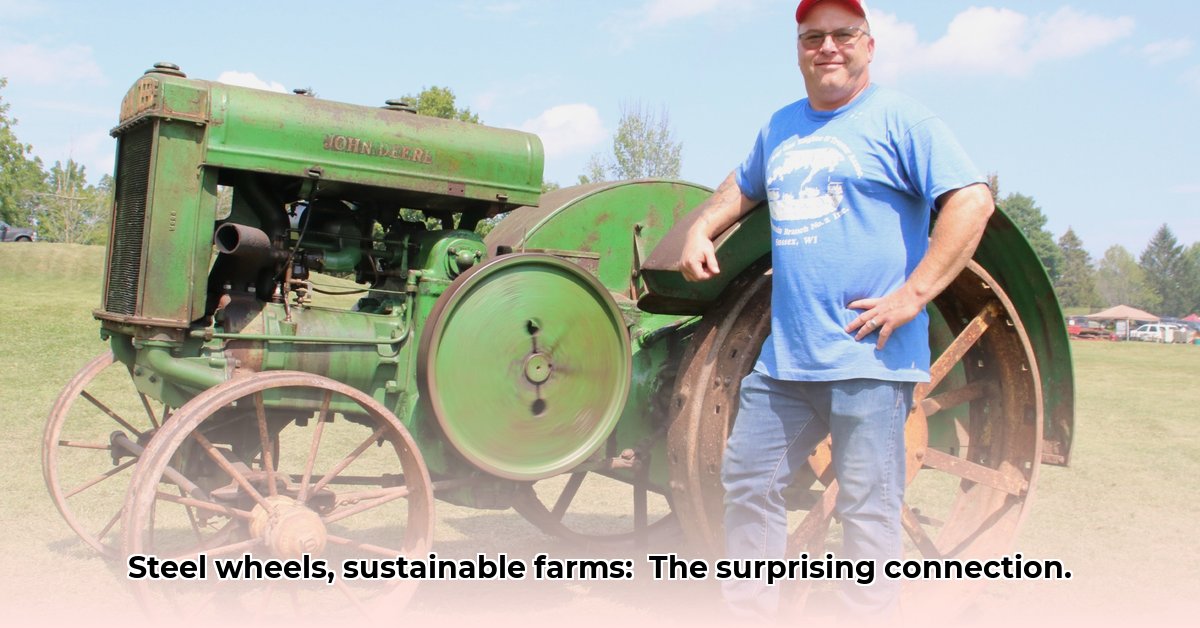
Steel Wheel Tractors: A Legacy of Sustainable Farming
The rhythmic clang of steel on soil—a sound echoing generations of sustainable farming practices. This isn't a relic of the past; it's a vibrant story unfolding in communities like the Groffdale Conference Mennonite community in Lancaster County, Pennsylvania. Their unwavering commitment to steel-wheeled tractors offers a compelling alternative to modern, rubber-tired counterparts, prompting a crucial question: Can tradition and innovation coexist to create a more sustainable agricultural future? This article explores the mechanics, environmental impact, and economic viability of steel wheel tractors, examining their enduring legacy and the opportunities they present for a more responsible approach to farming. For more on antique tractors, see this resource.
The Groffdale Story: A Tradition of Sustainability
The Groffdale community's dedication to steel-wheeled tractors stems from a deep-rooted commitment to land stewardship and a holistic approach to farming. Their choice isn't mere tradition; it’s a conscious decision to minimize soil compaction and environmental impact. "It's not just about the bottom line; it's about preserving the land for future generations," explains Elder John Miller, a Groffdale farmer with over 40 years of experience. Their farming practices, interwoven with their faith and community values, provide a compelling example of how deeply held beliefs can shape sustainable agricultural choices. How have they managed to maintain this practice in an era dominated by rubber-tired machinery? Their resilience and adaptation showcase a profound connection to the land and its resources. Do you think their approach could offer lessons for larger-scale farms?
A Look Under the Hood: How Steel Wheels Work
Unlike rubber-tired tractors, steel wheels interact differently with the soil. The solid steel provides more even weight distribution, resulting in significantly less soil compaction. This preserves soil structure, crucial for water infiltration, aeration, and preventing erosion. However, steel wheels present challenges—reduced traction, particularly in wet conditions, and potentially higher fuel consumption. Yet, the Groffdale farmers have mitigated these drawbacks through skillful field management techniques, showcasing how expertise and technology work hand-in-hand. "We've adapted our practices over generations," notes farmer David Stoltzfus. "It’s not just about the tractor; it’s about working with the land." What innovative strategies have they developed to overcome these challenges?
Environmental Impact: A nuanced assessment
The environmental impact of steel wheel tractors isn't simply black and white. While reduced soil compaction offers significant long-term benefits, including decreased erosion and improved water retention, the lower fuel efficiency might result in slightly higher carbon emissions per unit of work. However, the minimized road damage often overlooked, results in less wear and tear on infrastructure, translating to lower maintenance costs and reduced environmental impact. "While the fuel efficiency isn't as high," acknowledges Dr. Emily Carter, Agricultural Engineer at Penn State University, "the overall environmental footprint might be more favorable considering the long-term soil health benefits and the reduction of emissions from road maintenance." Further comprehensive research is needed to definitively weigh these factors. This highlights the need for a detailed life-cycle analysis, considering factors beyond immediate fuel consumption, to fully understand the environmental implications.
Challenges and Opportunities: Navigating the Future
Maintaining this farming tradition presents significant challenges. Economic viability is paramount; specialized repair skills are becoming scarce, and labor shortages pose a threat. Regulatory hurdles related to road usage could also arise. However, growing interest in sustainable agriculture presents opportunities. Collaborations with researchers, manufacturers, and agricultural organizations could lead to innovative improvements in steel wheel technology, potentially boosting efficiency and sustainability. "There's a real chance to bridge the gap between tradition and innovation," says Dr. Carter. This collaboration could involve enhancing wheel designs, exploring alternative materials, and creating training programs to preserve traditional expertise.
The Road Ahead: Collaboration and Innovation
The future of steel-wheeled tractors hinges on collaborative efforts. Further research, including detailed life-cycle analyses comparing steel and rubber-tired tractors, is crucial to quantify the long-term environmental and economic benefits. Developing training programs and apprenticeships is essential to preserve the specialized skills needed for maintenance and repair. Partnerships between the Groffdale community and modern manufacturers could leverage technological advancements without compromising the core principles of sustainable farming. Dr. Carter emphasizes the need for "a balanced approach, combining traditional knowledge with modern innovations to create more resilient and efficient systems." This combined approach can pave the path to a more sustainable agriculture future. How can we help ensure that this unique farming tradition persists for future generations?
Actionable Steps for a Sustainable Future
1. Invest in Research: Fund comprehensive life-cycle analyses comparing steel and rubber-tired tractors.
2. Develop Training Programs: Establish apprenticeships and training programs to safeguard traditional skills and knowledge.
3. Foster Collaboration: Support partnerships between the Groffdale community, researchers, manufacturers, and agricultural organizations.
4. Advocate for Policy Changes: Lobby for policies that support and encourage small-scale sustainable farming practices.
5. Implement Sustainable Manufacturing: Explore the use of recycled and renewable materials in steel wheel tractor manufacturing.
The Groffdale community's story serves as a powerful testament to the potential of sustainable agriculture. Their commitment to steel-wheeled tractors highlights the enduring relevance of traditional practices, combined with progressive innovation. By embracing collaboration and supporting research, we can ensure that this unique agricultural legacy persists—inspiring a more sustainable future for all.